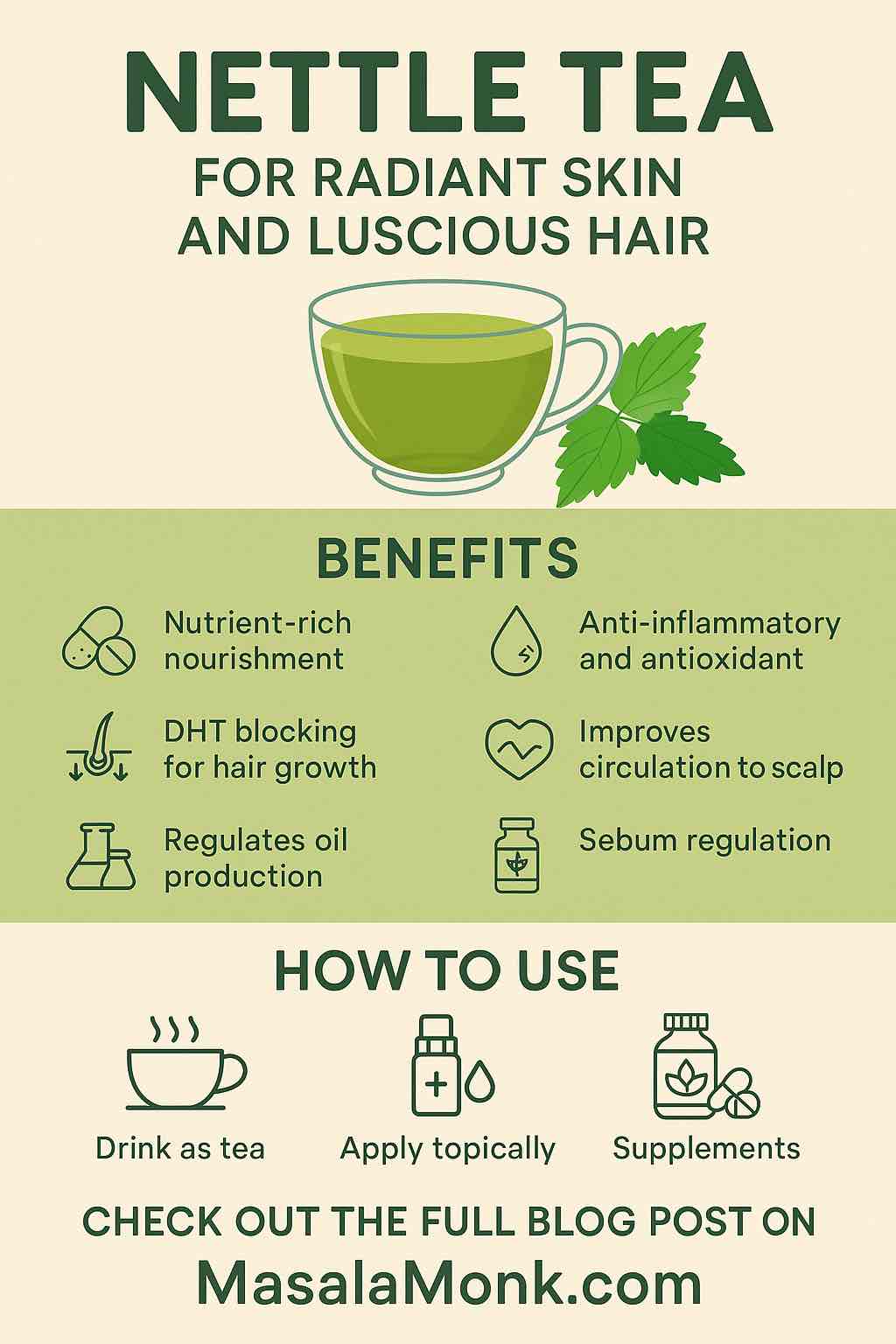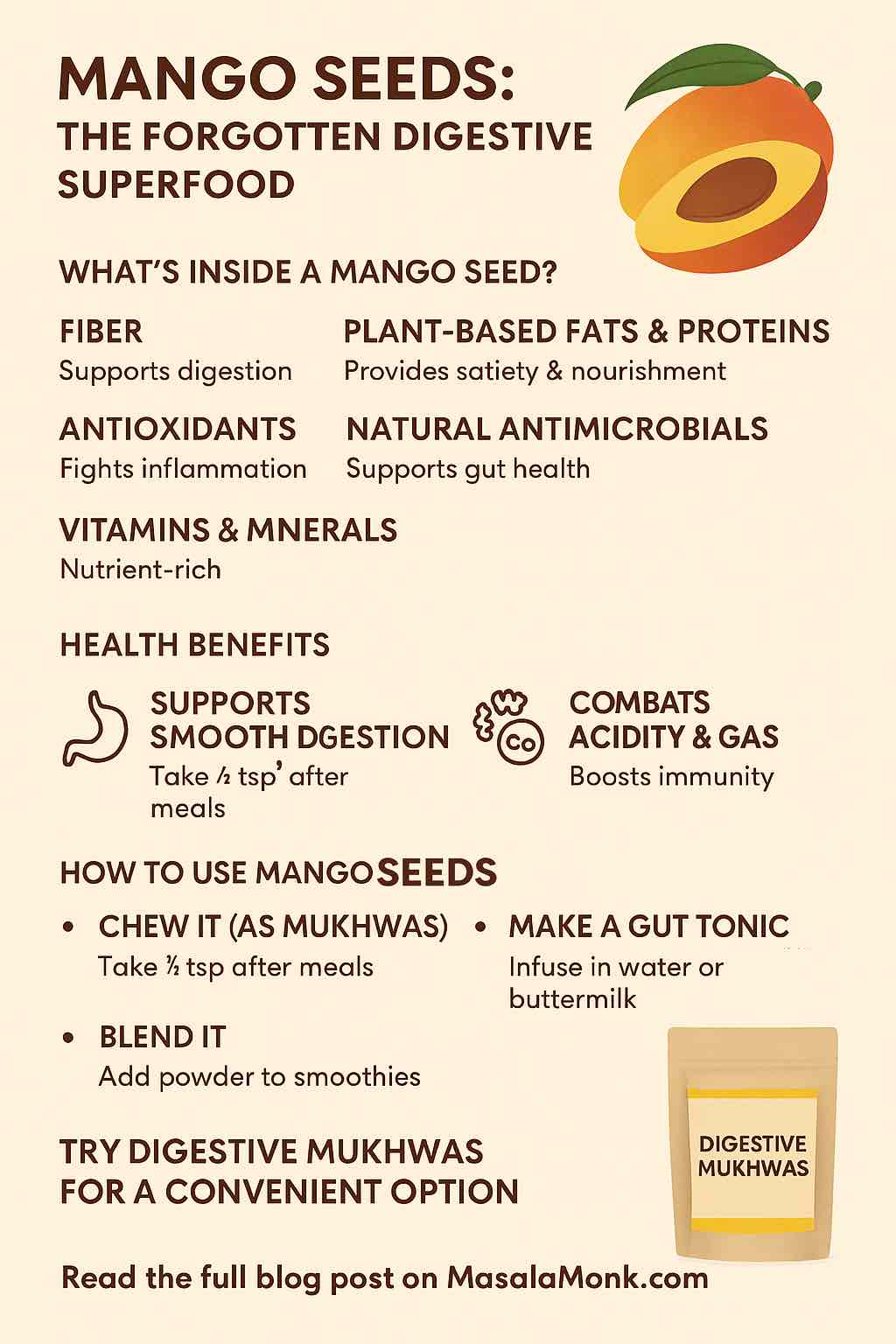
When you think of glowing skin and luxurious hair, stinging nettle (Urtica dioica) might not be the first plant that comes to mind. But this prickly wild herb—once notorious for its painful sting—has quietly earned superstar status among herbalists, beauty experts, and wellness enthusiasts. In this post, we’ll explore why nettle tea is having a major moment, what the latest science says, and how to make this ancient tonic work for you—inside and out.
Why Nettle? A Quick Introduction
Nettle is not a new trend. It’s been used for centuries as a healing tonic across Europe, Asia, and North America. What’s changed? Modern research is now catching up to folk wisdom, revealing how nettle supports healthy skin, robust hair, and overall wellbeing.
Key nutrients in nettle leaves:
- Vitamins A, C, D, E, and several B vitamins
- Iron, magnesium, silica, calcium, potassium
- Polyphenols and antioxidants
Nettle delivers a rare combination: deep nourishment, anti-inflammatory action, hormone-balancing effects, and gentle detox—all in a single cup of tea.
How Nettle Tea Benefits Skin and Hair (with Latest Evidence)
1. Nutrient-Rich for Cellular Repair
Your skin and hair are some of the first places to show nutrient imbalances or oxidative stress. Nettle tea provides bioavailable vitamins and minerals critical for:
- Collagen synthesis (vitamin C, silica)
- Wound healing (vitamin K, magnesium)
- Strong, shiny hair shafts (iron, folate, biotin)
2. Anti-Inflammatory and Antioxidant Effects
Nettle contains carotenoids, polyphenols, and flavonoids that help calm chronic inflammation—a root cause of acne, eczema, redness, and even scalp irritation. By fighting free radicals, nettle may help prevent premature aging and dullness.
2025 Research Spotlight:
In silico studies confirm nettle’s antioxidants effectively neutralize skin-damaging free radicals and reduce inflammatory markers in both scalp and dermal cells.
3. DHT Blocking for Hair Growth
One of nettle’s standout benefits: it inhibits 5α‑reductase, the enzyme that converts testosterone to DHT—a key player in pattern hair loss. While more research is needed on nettle tea specifically, clinical trials with nettle-based shampoos and serums found:
- Up to 90% reduction in hair loss after 6 months (compared to ~40% in placebo group)
- Increased hair density and reduced shedding
4. Improves Scalp and Skin Circulation
Compounds like beta-sitosterol in nettle help enhance microcirculation. This means more oxygen and nutrients reach your scalp and skin, supporting growth and repair.
5. Sebum Regulation
Nettle has a natural balancing effect on oil production, making it a smart addition for both oily and combination skin types, as well as greasy scalp and hair.
How to Use Nettle for Beauty: Tea, Topical, and More
Here’s how to make nettle part of your beauty routine for maximum benefit:
1. Drink It: Daily Nettle Tea Ritual
- How: Steep 1-2 teaspoons of dried nettle leaf in hot water for 5–10 minutes. Strain and enjoy 1–2 cups per day.
- Flavor tip: Add a squeeze of lemon, honey, or mint to offset the earthy taste.
- What to expect: Gradual, steady improvements. Most people report brighter skin and thicker hair after 2–3 months of regular use.
Pro Tip:
Nettle’s natural diuretic effect helps flush toxins, but be sure to stay hydrated!
2. Apply Topically: Rinses, Oils, and Masks
DIY Nettle Hair Rinse:
- Steep 1–2 tablespoons dried nettle in 2 cups boiling water.
- Cool, strain, and pour over clean, damp hair as a final rinse.
- Massage gently into scalp; do not rinse out immediately.
Nettle-Infused Face Mist:
- Brew strong nettle tea, allow to cool, and pour into a spray bottle.
- Mist onto cleansed skin as a natural toner to soothe inflammation and balance oil.
Nettle Oil for Scalp:
- Blend nettle-infused oil (or purchase pre-made) with a few drops of rosemary or peppermint oil.
- Massage into scalp weekly to stimulate follicles and ease dryness or dandruff.
3. Supplements and Serums
- Capsules or tinctures: Consider 500–1000 mg/day, but check with your doctor, especially if you take medication.
- Serums and shampoos: Look for high-quality, standardized nettle extract near the top of ingredient lists.
Real-World Stories
“I started using nettle tea as a last resort for postpartum hair shedding. Three months in, my hair feels stronger and I have fewer breakouts. The results are real!”
— Jane D., London
“Nettle rinses brought shine back to my curls and calmed my itchy scalp. I wish I’d known about this years ago!”
— Tyler S., NYC
What Science Still Can’t Prove (Yet)
While early results and centuries of folk wisdom are promising, large-scale clinical trials on nettle tea for skin and hair are limited. Most studies focus on topical extracts, not tea. Individual response can vary based on genetics, hormones, and overall lifestyle.
Are There Any Side Effects?
- Nettle is safe for most adults when used appropriately.
- If you are pregnant, breastfeeding, or on blood thinners or diuretics, consult your healthcare provider first.
- Some people report mild digestive upset or allergic reactions—start with a small amount and monitor your response.
Making Nettle Tea a Ritual (That Sticks)
- Start a 30-day nettle challenge: Take a selfie before, and again at 4 and 8 weeks to track progress.
- Pair with mindful moments—use tea time as a reset from your daily hustle.
- Invite a friend to join—rituals are easier (and more fun) together!
Final Take: Should You Try Nettle Tea?
If you’re seeking a simple, holistic way to support radiant skin and healthy hair, nettle tea is an easy, affordable, and evidence-backed place to start. While it’s not a miracle cure, it’s a powerful ally—especially when combined with good sleep, a balanced diet, and gentle self-care.
Ready to get started?
Brew a cup, embrace the ritual, and let nature’s pharmacy nourish you from root to tip.
FAQs: Nettle Tea for Skin and Hair
1. Can anyone drink nettle tea, or are there people who should avoid it?
Most healthy adults can safely enjoy nettle tea. However, pregnant or breastfeeding individuals, and those taking blood thinners, blood pressure medications, or diuretics should consult their healthcare provider before starting nettle due to possible interactions.
2. How quickly can I expect to see results in my skin or hair after starting nettle tea?
Most people notice subtle improvements in 4–8 weeks of consistent use, but individual response varies based on lifestyle, diet, and genetics. For some, hair shedding decreases after a month; for others, it may take longer.
3. Does nettle tea taste good? Can I improve the flavor?
Nettle tea has an earthy, grassy flavor. To make it tastier, add lemon, honey, fresh mint, or blend it with green or herbal teas.
4. Is there a difference between using nettle tea and nettle extract for hair and skin?
Nettle extract (used in serums or shampoos) is more concentrated for topical benefits and often used in clinical studies. Nettle tea offers systemic support and nutrient intake, best for overall health and gentle, ongoing benefits.
5. Can I use nettle tea directly on my hair and skin?
Yes! Use cooled, strained nettle tea as a hair rinse, facial mist, or gentle toner. Always patch-test before widespread use, especially if you have sensitive skin.
6. Where can I buy high-quality nettle tea?
Look for organic dried nettle leaves from health food stores, reputable online herbal retailers, or specialty tea shops. Avoid products with fillers or artificial flavors.
7. Can I make nettle tea from fresh nettle leaves?
Yes, but always wear gloves to avoid stings before steeping. Rinse thoroughly and steep as you would dried nettle (using a bit more volume for fresh leaves).
8. Are there any side effects of drinking too much nettle tea?
Overconsumption may cause upset stomach, mild diuretic effects (increased urination), or rare allergic reactions. Stick to 1–2 cups daily unless otherwise advised by your doctor.
9. Will nettle tea interfere with other supplements or medications?
It may interact with blood pressure drugs, blood thinners, and diuretics. Always check with your healthcare provider if you are on regular medication.
10. Can I combine nettle tea with other natural remedies for better results?
Absolutely! Many people pair nettle with herbs like horsetail, rosemary, or saw palmetto for enhanced hair benefits. For skin, pair with chamomile or calendula. Always introduce new botanicals one at a time to monitor effects.










